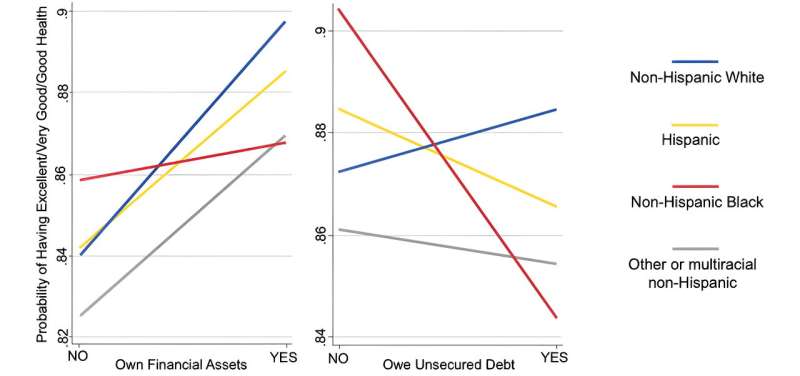This article has been reviewed according to Science X's editorial process and policies. Editors have highlighted the following attributes while ensuring the content's credibility:
fact-checked
trusted source
proofread
Study shows wealth does not ensure equal levels of health across race, ethnicity

Money may not buy happiness, as the saying goes, but it can buy health—to an extent. A new study from the University of Kansas has found that the same amount of wealth does not ensure the same level of positive health outcomes for everyone.
An analysis of national data and reports of mental health and well-being showed that it takes more financial assets for people of color to have the same health outcomes as white Americans. Surprisingly, the study found that unsecured debt is associated with better health among white individuals but is linked to worse health outcomes for people of color. That indicates policy is needed to address wealth disparities from the earliest stages of life, the study's author wrote.
Sicong "Summer" Sun, assistant professor of social welfare at KU, analyzed data on wealth, assets, debt and other socioeconomic factors and compared that with the self-reported physical and mental health of more than 7,000 Americans ages 30–36. The data was part of the National Longitudinal Survey of Youth 1997, which periodically collects data from participants on various aspects of their lives. The study was published in the Journal of Racial and Ethnic Health Disparities.
Wealth is often measured as net worth by calculating total assets minus total debt. Though net worth provides helpful information on household socioeconomic standing and economic resources, it provides little information on the most effective approaches to intervene. To address this gap, Sun analyzed individuals' wealth as a measure of their financial assets, such as savings, retirement plans, stocks and bonds; nonfinancial assets, including real estate and vehicle value; secured debt, such as mortgages; and unsecured debt, including student loans, credit card debt and payday loans.
"I want to dissect the components of wealth and assess how they are associated with health," said Sun, who is also a faculty affiliate with the Toni Johnson Center for Racial and Social Justice. "I think the findings can be very helpful in identifying potential policy and program levers to help ensure better wealth and health outcomes for all. There are various types of assets and debts, each of which is linked to health differently."
The study found that financial assets and secured debt were positively associated with self-rated health and mental health. Unsecured debt was negatively associated with mental health. Efforts to expand and improve financial access and inclusion, such as emergency savings, banking and financial services, safe, affordable credit and affordable housing loans may yield health benefits in addition to economic well-being. Thus, interdisciplinary research collaboration and cross-sector partnerships could be productive, Sun said.
However, the relationships between wealth and health vary by race/ethnicity, the results showed. The study analyzed wealth and health outcomes for non-Hispanic white, non-Hispanic Black and Hispanic Americans.
"I think one of the most interesting findings is in relation to unsecure debt," Sun said. "In this life stage (30–36), I found all types of assets and debts, the prevalence and amount were highest for white young adults. For example, 74% of non-Hispanic white young adults reported having unsecured debt, in contrast to 57% of non-Hispanic Black young adults.
"Unsecured debt was protective of health for white respondents but was detrimental for people of color, especially Black young adults. This indicates that debt carries various social and economic implications, challenges and ways of affecting people, and these aspects differ between white Americans and people of color."
Other aspects of socioeconomic status also proved to be important for health. Racial disparities in self-rated health were attenuated by controlling for income, education, employment and net worth. This finding points to the importance of addressing socioeconomic inequities during young adulthood, Sun said.
"Not surprisingly, disparities emerge early in life for people of color," Sun said. "Thinking about policy and program interventions like asset building and debt relief are helpful, not only for helping people attain assets, but ensuring better health outcomes throughout the life course."
The findings add to Sun's previous work on the effects of wealth on health in young adulthood.
The results also show the importance of policy that begins to address wealth and health disparities from a young age, such as universal Child Development Accounts and baby bonds. Additionally, addressing unsecured debt through policy such as student loan forgiveness could yield health benefits, especially for people of color, Sun said. Such policies could help address structural injustices and lead to better health outcomes for all, which in turn would have a positive social and economic effect.
"Money can buy health to a certain extent, but not at the same level for everyone," Sun said. "Simply having more money or resources isn't enough to make sure everyone is equally healthy. We must critically examine how the systemic power structure is linked to the social construction of race. It is important to address historical legacies of inequities in financial systems."
More information: Sicong Sun, Building Financial Capability and Assets to Reduce Poverty and Health Disparities: Race/Ethnicity Matters, Journal of Racial and Ethnic Health Disparities (2023). DOI: 10.1007/s40615-023-01648-9

















